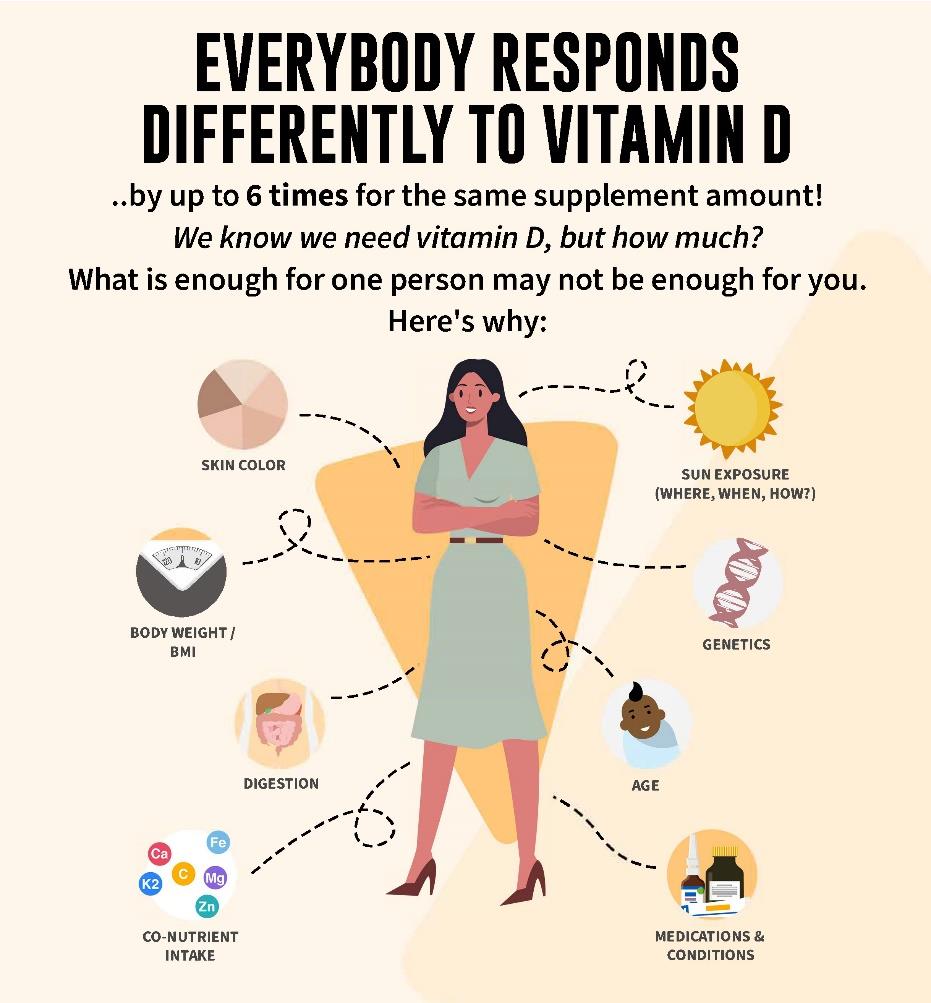The Power of ONLY 1 DROP – 1 drop of Ditamin BabyVit D3 for healthy start
The Power of ONLY 1 DROP – 1 drop of Ditamin BabyVit D3 for healthy start

Far far away, behind the word mountains, far from the countries Vokalia and Consonantia, there live the blind texts. Everyone responds differently to vitamin D… by up to 6 times for the same supplement amount! Whether getting your vitamin D from sun or supplement, several factors can affect how much vitamin D is made, absorbed, or converted for use in the body. The infographic below summarizes some of these different factors that can affect how much vitamin D the body may actually be getting on a daily basis.
If so, it is important to understand how certain factors can influence how an individual’s vitamin D level responds to their vitamin D supplementation amount (called the dose-response). These factors can cause a wide range of serum level responses that can be produced when looking at any specific supplementation amount. For example, it is possible for a supplemental intake of 4000 IU/day to result in a serum level of 25 ng/ml (62.5 nmol/L) in one individual, and 60 ng/ml (150 nmol/L) in another.
Sun Exposure: Where, When, How. If you’re relying more heavily on sun exposure (or indoor UVB) for vitamin D, not exposing enough skin, high sunscreen use, or lack of mid-day (10 am – 2 pm) exposure will limit vitamin D production. Environmental factors such as smog and cloud cover or residing in a higher latitude will also reduce exposure to UVB radiation.
Skin Color. The amount of melanin in the skin influences vitamin D production. Someone with more melanin (darker skin) might need 30 minutes in the sun to achieve the same production of vitamin D that someone with less melanin (lighter skin) will achieve in 10 minutes. While some people can achieve very high levels (~60 ng/ml or 150 nmol/L) of vitamin D through regular sun exposure alone, others cannot achieve these levels without supplemental vitamin D.

vitamin D (e.g. milk and other dairy products, some orange juice and cereals) can impact vitamin D levels. However, the amount of vitamin D available in food is rather small compared to what most people need to achieve a blood level of at least 40 ng/ml (e.g. salmon has ~450 IU/serving and fortified milk has ~120 IU/cup).
With almost 90% of the general population having vitamin D levels below the recommended 40-60 ng/ml (100-150 nmol/L), it is obvious that most people need more vitamin D. While most of us cannot achieve a vitamin D level of 40-60 ng/ml from sun alone, either due to our lifestyle, where we live, or other circumstances, we can certainly reach those levels with the right amount of supplementation.
Try Ditamin BabyVit D3 and AdulVit D3, it’s just pure FDA, GMP standard Vitamin D3 without any artificial additives it’s tasteless, colourless and odourless.
In addition, along with the entire types of Vitamin D supplements available in the market Ditamin AdulVit D3 50,000 IU, 5,000IU and 1,000IU are the smallest pills worldwide ever because patient’s compliance matters to United Pharma Canada.

The Power of ONLY 1 DROP
1 drop of Ditamin BabyVit D3 for healthy start
© 2024 Ditamin Babyvit • All Rights Reserved